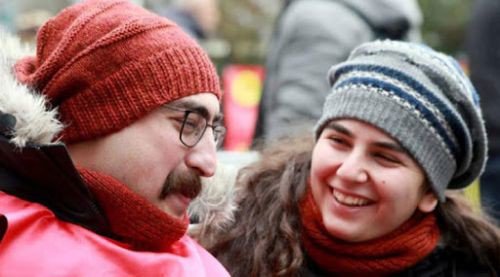Click to read the article in Turkish
The Constitutional Court has handed down its decision regarding the application of Esra Özkan Özakça, who participated in the "I want my job back" protests in Yüksel street in Ankara after being dismissed from public service by a Statutory Decree and was given a house arrest.
Pronouncing its judgement, the Constitutional Court has concluded that the investigative authorities that gave the ruling of house arrest did it "without presenting concrete facts as to her committal of the crime."
In the detailed decision of the supreme court shared with the public today (December 30), it has been indicated that "the right to personal liberty and security guaranteed by Article 19 of the Constitution has been violated on the grounds that the judicial control measure in the form of not allowing the person to leave her resident was against the law."
While the decision has been given by a majority of votes, Özakça will now be paid 20,000 lira (approx. 2,700 USD) in non-pecuniary damages.
'No evidence to prove organizational attitude'
The detailed decision of the Constitutional Court has underlined that ankle monitors are put on the ones who are sentenced to house arrest, which means an intervention in their freedom. The decision has read:
"Given the nature, implementation and characteristics of the measure, it needs to be concluded that its restrictive effect on freedom of movement is far beyond freedom of travel in terms of its degree and intensity and, hence, it constitutes an intervention in the right to personal liberty and security."
The Constitutional Court has also stressed that house arrest is a measure like arrest and "the precondition for implementing this measure is a flight risk or strong indication suggesting the person's criminality":
"In the related investigation documents, no concrete facts or findings were presented as to the applicant's committal of these acts in an organizational relation or in an organization behavior on the part of the applicant.
"Based on the available documents, it has been concluded that strong indications suggesting that the applicant committed a crime in the concrete case were not sufficiently presented by the investigative authorities."

What happened?
Esra Özkan Özakça was a teacher at the Primary School in Ürünlü Village in Mazıdağı district in Turkey's southeastern province of Mardin. She was dismissed from public service while working there.
In her statement, she explained the process as follows:
"I was discharged from my profession by the Statutory Decree dated February 7, 2017. My husband Semih Özakça was a teacher with me in Mazıdağı district. He was previously discharged on October 29, 2016.
"My husband tried many ways to seek his rights after the discharge; he applied to the Governor's Office, he filed a lawsuit, he applied to the Ministry of National Education. None of these applications gave any results.
"In response, he started protesting in Yüksel Street in Ankara with Nuriye Gülmen, who was also discharged like him. I came to Ankara with him. But I did not participate in the protests. I was reinstated a month later.
"While my husband was protesting, I was discharged. I started to go through the same process myself. In response to this, I started protesting in Yüksel Street with my husband and other discharged people. After my husband was arrested in Ankara on May 23, 2017, I went on a hunger strike."
Esra Özkan Özakça was taken into custody on July 6, 2017 as part of an investigation launched by the Ankara Chief Public Prosecutor's Office into the sit-in and hunger strike protests.
The Ankara 5th Penal Judgeship of Peace ruled that Esra Özkan Özakça should be "given judicial control measures in the form of not leaving the residence on charges of being a member of a terrorist organization and propagandizing for a terrorist organization."
In response, she made an individual application to the Constitutional Court. The supreme court handed down its detailed decision today. (AS/SD)













